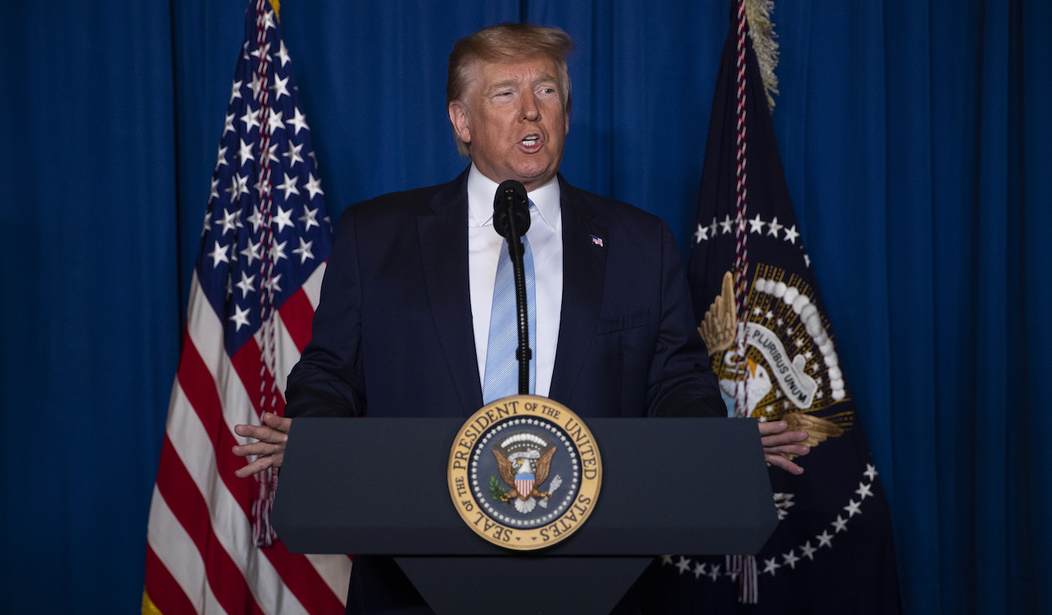If you ... intend to be first in, and hit your enemy in the belly, and kick him when he is down, and boil your prisoners in oil (if you take any!), and torture his women and children, then people will keep clear of you." -- John Arbuthnot Fisher, Baron Fisher of Kilverstone (1841-1920).
Well. Um. Yes. We can agree, probably, that the mighty commander of the Royal Navy at its mightiest (the early 20th century) was talking for effect, much to the relief of potential captives of the world's mightiest empire. What a point all the same: Don't cross the British line; you'll be very, very sorry you did.
I wouldn't bet on President Donald Trump's having ever heard of the great Fisher. But the understanding Fisher wished to convey -- that of the need for deterrence and punishment of bad behavior -- is as old as humanity.
Trump grasped the point when he ordered the taking out of Maj. Gen. Qassem Soleimani. Soleimani had more than merely crossed Uncle Sam; he had contrived the deaths of approximately 600 American military personnel. It was time he understood that bad actions have bad consequences, the objective being to prevent their recurrence. That, as it happens, is what Trump meant when he said he wasn't trying to start a war; he was trying to prevent one from breaking out.
The proposition is so logical you would suppose one or two of the Democrats' presidential candidates would have gotten it, along with a majority share of media writers and talkers.
Why didn't they? My guess comes in two parts -- and it's only a guess, due to my longstanding inability to get inside others' minds and crawl around (the pattern practiced at The New York Times and elsewhere.)
Recommended
The first part of my guess is that an inadequate number of people care anymore about history and its lessons, save when the past can be used to shame adversaries. The endlessly silly debate over Confederate statues is case in point. That dead people have anything useful to tell live people is no longer a widely accepted assumption.
Then there's the second facet of my guess: Because Trump issued the shoot-to-kill order, there had to be something wrong with it -- some reflection on his mental processes, some indifference to real-world consequences. Besides, it takes attention away from impeachment!
The main point requiring nutrition and sustenance is, in any case, the Fisher point, however outrageously expressed. There are subtler versions; for instance, that of the fourth century Roman military strategist Vegetius: "Let him who desires peace prepare for war." Like Lord Fisher, Vegetius is sending a message: You won't hurt us without cost to yourself.
The truth is the malignant Soleimani got away for a long time -- the whole of the present century, practically -- with targeting Americans and the American interest. Letting him alone for some considerable period was possibly pardonable from an American standpoint, in that you can't swat all your enemies at once. You swat those you can. All the same, given his latter role in the destruction of Syria and the subversion of Iraq, Soleimani made himself an indispensable target. His hands dripped as if with blood. Letting him roam about, killing whomever he wanted to kill under whatever circumstances, would have amounted to criminal negligence on America's part.
Yes, goes the progressive riposte, and what about the unknowable consequences of wiping such an insect from your boot sole? Aren't there other insects out there, with extensive stingers? What if they swarm us? What if -- we really get down here to brass tacks -- Iran goes nuclear?
Another of history's lessons, a supplement to the need for warning off the wicked, is that none of us can see infallibly the consequences of specific actions. "You commit yourself and then you see," said Napoleon Bonaparte. One thing we should be able easily enough to see is that right and wrong aren't fictions or brain fevers. They live. So, generally, do those who choose correctly between them.
William Murchison is writing a book on moral reconstruction in the 21st century. His latest book is "The Cost of Liberty: The Life of John Dickinson."
























Join the conversation as a VIP Member